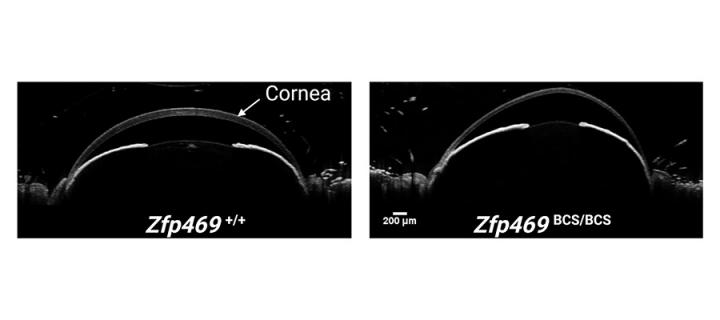Mouse model lends insights into genetic eye condition
Mice with mutations in the gene ZNF469 show reduced corneal thickness and strength: September 2021
Mouse model lends insights into genetic eye condition

Brittle Cornea Syndrome (BCS) is a rare genetic condition characterised by extreme thinning of the cornea and sclera. This can lead to severe corneal damage and vision loss. Some people with BCS also experience hearing loss and hip dysplasia. Limited therapeutic options are currently available to reduce or prevent vision loss.
Genetic family studies have revealed that BCS results from mutations in the poorly understood genes ZNF469 or PRDM5. To help understand BCS, researchers at the MRC Human Genetics Unit, University of Edinburgh have created a mouse model.
Using CRISPR-Cas9 genome editing, a mutation found in human disease was created in the mouse equivalent of the ZNF469 gene. The resulting mice underwent ophthalmic examination. This showed that mutation of ZNF469 causes significant thinning of the cornea due to reduced thickness of the stroma during corneal development.
Molecular characterisation of the cells that make the stroma found an approximately 50% reduction in Type I collagen production. Normally the most abundant collagen in the stroma, this decrease changed in the size of the collagen fibrils in the mutant mouse corneas. This correlated with a loss of biomechanical strength in the cornea.
We are grateful to our funders, Fight for Sight and the Medical Research Council, who made this work possible. We hope the model, which closely mimics the human disease, will help us to identify and develop new therapeutic targets for this devastating condition.
This work shows the value of mouse models for understanding human sight loss and further exploration of the genetic pathways that control corneal health could guide potential therapeutic strategies to reduce or prevent vision loss.
Links:
Full article in Disease Models and Mechanisms https://doi.org/10.1242/dmm.049175

